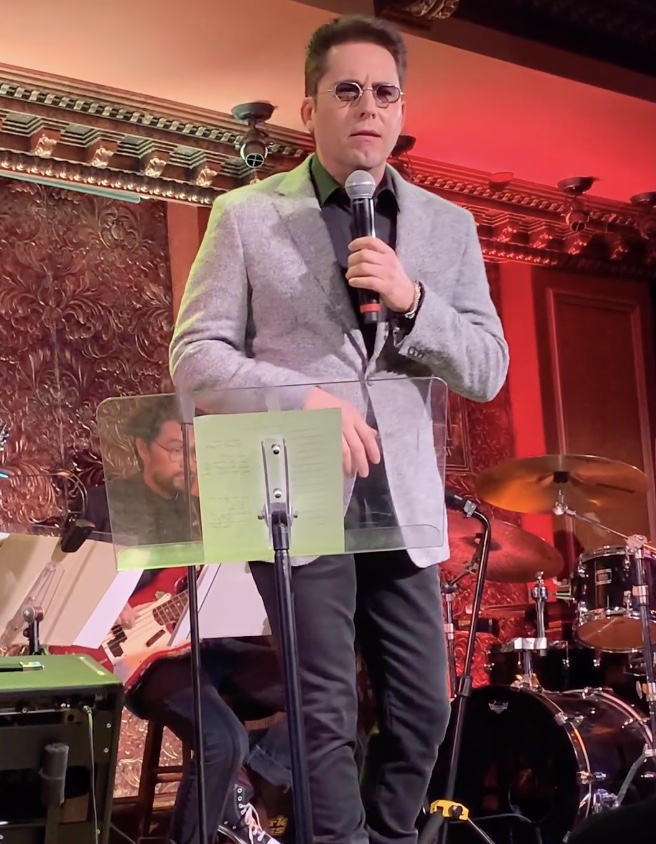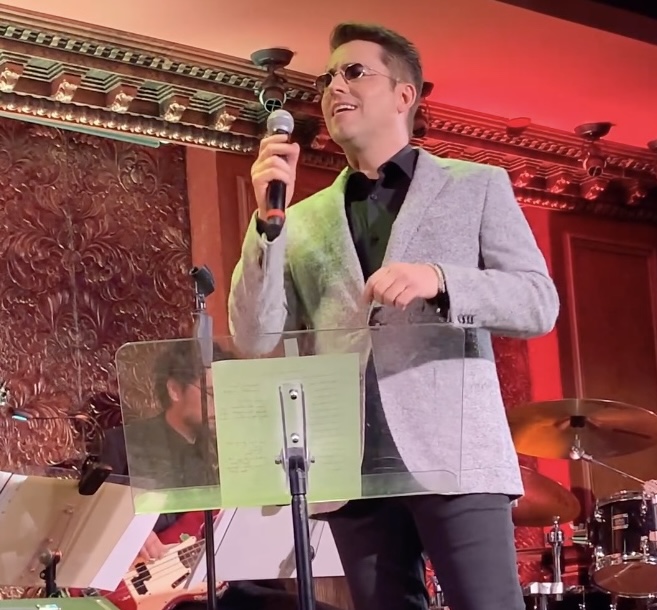Review by Marilyn Lester . . .
In 2006 John Lloyd Young won the Tony Award for Best Leading Actor in a Musical for his role as Frankie Valli in Broadway’s Jersey Boys. It was a role that propelled success. Should anyone call to question that win, his talent is such that Young is also the only American actor to date to have received all four major Lead Actor honors in a Broadway musical: beside the Tony, he won the Drama Desk, Outer Critics Circle, and Theatre World awards. And he has a Grammy to boot. No wonder: tick off the boxes for a voice that won’t stop—ranging from baritone lows to the famed falsetto—charisma, charm and to top it all off, movie star good looks.
But unlike the goddess Athena who emerged whole from the head of Zeus, Young did not land on the stage of the August Wilson Theater fully formed, and that is the basis for his latest show at 54 Below on November 15, John Lloyd Young’s Broadway. Threaded through the narrative was the thematic mantra, “Every Broadway career starts with a dream.” Young’s began, as so many dreams do for performers, in his youth, with family who was Broadway musical wise. He also had the kind of fire within that led him to a side hobby of trips to the old Footlights Record store in New York, collecting foreign language albums of Broadway musicals. In college he hung out in piano bars. Like most aspiring actors, he went through the steps of training and auditioning and hit the deserved jackpot with the story of those boys from Jersey.
But one swallow does not a summer make, and his successful career over the years since Jersey Boys (stage and movie versions) has included an intensive in cabaret and concert stages. This celebrity has come with a huge fan base and thus consequences. How do you satisfy avid fans who want Four Seasons tunes and to perpetually see “Frankie Valli” live? It’s a delicate operation, and so the evolution of John Lloyd Young began with mining that well, augmenting with some variation in the music and of appearing in shades and leather and assuming the role. In John Lloyd Young’s Broadway there was some of that; you don’t throw the baby out with the bathwater. Familiar tunes by Bob Gaudio and Bob Crewe,“My Eyes Adored You” and “Can’t Take My Eyes Off You” made their appearance, as did a hopping, audience participating rendition of “Sherry” to close the set.

The shades, now a trademark of sorts, made a brief appearance, but now a mature Young applied that superlative voice to varied Broadway numbers. Challenging André deShields supremacy, he opened with an intense “So You Wanted to Meet the Wizard” (Larry Kerchner, attributed to Charlie Smalls). He followed with an R&R, Latin-influenced “My Favorite Things” (Richard Rodgers, Oscar Hammerstein II), a rendition pretty far away from the sweet Julie Andrews version, setting the tone of the show. Another notable difference in this iteration of John Lloyd Young, was his music director. After working for years with Thomas Faragher, and one or two others, he’s now collaborating with Ron Abel, who’s a tremendously good match for him. Abel’s arrangement of the 1929 standard “Mean to Me” (Fred Ahlert, Roy Turk), was a beauty, giving Young a chance to stretch out in a new direction of storytelling.
From crooner with another tune, “I Have Dreamed” (Richard Rodgers, Oscar Hammerstein II), the anthemic was also aced. Like other golden throats—think of Brian Stokes Mitchell’s “Make Them Hear You,” Raul Esparza’s “Being Alive” or Willy Falk’s “Why, God, Why?”—Young gave powerful renditions of “The Impossible Dream” (Mitch Leigh, Joe Darion) and
“Empty Chairs and Empty Tables” (Claude-Michel Schönberg, Alain Boublil). More treasures from the show included Abel singing “backup” on “All I Care About” (John Kander, Fred Ebb). Young would make a terrific Billy Flynn and maybe he will with Chicago powering along on Broadway. Another meaningful interpretation of lyric came with “My Heart Stood Still” (Richard Rodgers, Lorenz Hart).
This more expanded direction for Young brings the promise of more thrills ahead. With those vocal chops and the keen interpretive storytelling he’s shown recently, the wish is for a tighter narrative and more in curated music. That fan base can’t help but follow. In addition to Abel, musical support was provided by bassist Derek Nievergelt, guitarist Sean Harkness and drummer Ray Marchica. Harkness and Marchica, two of the most in-demand players in New York, were in their respective instrumental zones of excellence. Harkness had some dazzling solo/features, while Marchica pulled out all the stops with nuances and rhythmic enhancements.


















